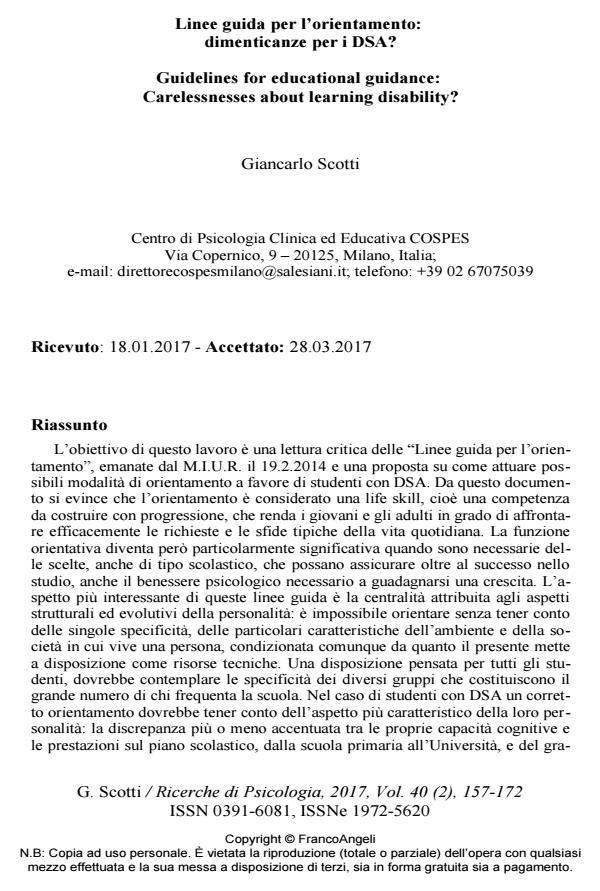Guidelines for educational guidance: Carelessnesses about learning disability?
Journal title RICERCHE DI PSICOLOGIA
Author/s Giancarlo Scotti
Publishing Year 2017 Issue 2017/2
Language Italian Pages 16 P. 157-172 File size 190 KB
DOI 10.3280/RIP2017-002001
DOI is like a bar code for intellectual property: to have more infomation
click here
Below, you can see the article first page
If you want to buy this article in PDF format, you can do it, following the instructions to buy download credits

FrancoAngeli is member of Publishers International Linking Association, Inc (PILA), a not-for-profit association which run the CrossRef service enabling links to and from online scholarly content.
The aim of this work is a critical reading of the "Guidelines for Educational Guidance" issued by the Italian Ministry of Education (MIUR) on 19/02/2014, and to propose possible ways to help students with Learning Disability (L.D.) with their educational guidance. From this paper we deduce that educational guidance is to be considered a life skill, namely an ability which has to be built progressively, and which should make young people and adults able to success-fully deal with daily life challenges. Guidance function becomes particularly im-portant when the students have to make a choice for their own scholastic future. These choices are meant to give assurance of psychological wellbeing for a bet-ter growth, as well as scholastic success. The focus on structural and developmental aspects of personality are the most interesting feature of these guidelines: it is impossible to help someone in his own choice without caring about his peculiarities, the environment and society conditions where he lives, and the age he lives in. A document intended for all the students cannot ignore the peculiarities of the different groups that make up the great number of those who go to school. In the case of L.D. students, a proper guidance should care about their peculiarities: the difference between their cognitive abilities and their scholastic performances from elementary school to University, and their consciousness and acceptance of their rubs. However, reading this paper, we can notice a rather general attention to the weak category, the function conferred to the ICTs (Information and Communication Technologies) with quite magical powers, and a sort of optimism that is contradicted by clinical evidences in students with L.D. See below the good practices for the prevention of scholastic failure for students with L.D. administered by the experts of COSPES centres, and the information and clinical evidences that you should get to undertake an educational guidance path.
Keywords: Educational guidance, school legislation on guidance, learning disa-bility rehabilitation with ICT.
- Cornoldi, C. (1991). Introduzione alla conoscenza dei disturbi dell’apprendimento. In C. Cornoldi (Ed.), I disturbi dell’apprendimento. Bo-logna: Il Mulino.
- COSPES (Ed.) (1990). Orientare: chi, come, perché. Manuale per l’orientamento nell’arco evolutivo. Torino: SEI.
- COSPES (Ed.) (2005). Orientare alle scelte. Percorsi evolutivi, strategie e strumenti operativi. (Coordinamento di P. Del Core, S. Ferraroli, U. Fontana). Roma: LAS.
- Dell’Oro, F. (2015). Cercasi scuola disperatamente. Milano: Feltrinelli.
- Franchini, R. (2015a). La sperimentazione iPad della Federazione CNOS-FAP: punti di forza e elementi di criticità. Rassegna CNOS-FAP, 31(1).
- Franchini, R. (2015 b). L’educativo digitale: esperienze internazionali a confronto. Rassegna CNOS -FAP, 31(2).
- Isaacson, W. (2007). Einstein, His life and Universe. Trad. italiana: Einstein, la sua vita, il suo universo, 2008 . Milano: Mondadori. (Le notizie che possono interessare quanto affermato sono nel cap. 1 da pag 16 a pag.32)
- Nota, L., & Soresi, S. (2010). Insegnare a scegliere e a decidere. In L. Nota & S. Soresi (eds.), Sfide e nuovi orizzonti per l’orientamento. 1.Metodologie e buone pratiche. Firenze: Giunti OS.
- Pellerey, M. (2015a). L’integrazione delle tecnologie mobili (tablet, smartphone) nel contesto scolastico e formativo: alcuni orientamenti operativi derivanti da uno studio realizzato in ambito CNOS-FAP. Rassegna CNOS-FAP, 31(1).
- Pellerey, M. (2015b). Uso didattico delle tecnologie mobili e risultati di apprendimento: alcuni apporti derivanti da ricerche internazionali. Rassegna CNOS – FAP, 31(2).
- Scotto Di Luzio, A. (2015). Senza educazione. Bologna: il Mulino.
- Stili educativi genitoriali, benessere scolastico e rendimento scolastico in adolescenza Maria Giulia Olivari, Eleonora Mascheroni, Gaia Cuccì, Emanuela Confalonieri, in RICERCHE DI PSICOLOGIA 1/2019 pp.9
DOI: 10.3280/RIP2019-001001
Giancarlo Scotti, Linee guida per l’orientamento: dimenticanze per i DSA? in "RICERCHE DI PSICOLOGIA " 2/2017, pp 157-172, DOI: 10.3280/RIP2017-002001